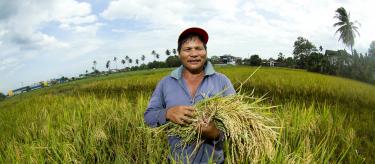Recognizing the high stakes of tackling the climate crisis, countries have set national targets to limit greenhouse gas emissions and increase resilience to climate change impacts.
Implementing these climate targets requires large amounts of finance. More and more countries are pursuing efforts to make the best use of national finance from domestic sources to green their economies and invest in adaptation.
However, countries need more finance for their climate targets than what they can source domestically. This is why they are exploring other opportunities ranging from micro-financing to private investments to global funds such as the Global Environment Facility and the Green Climate Fund.
Governments can also mobilize climate finance from new sources such as carbon trading schemes, results-based payments for healthy ecosystems, or green financing products.
At the same time, through global climate negotiations, countries are trying to work out how to set more ambitious targets for providing international climate finance to those that need it the most. This includes negotiations around who would contribute to the financial support and who would receive what share of the support provided.
In 2009, high-income countries with a significant historical contribution to climate change had committed to raising US$100 billion every year by 2020 to fund climate action in low-income countries.
However, for many years this goal was not reached and substantially more funding is now required to advance climate action with the urgency required.
Under the Climate Promise, UNDP helps countries make the most out of existing national finance to reach their climate targets. We also support countries to identify the appropriate mix of measures including incentives, regulations, certifications and investments, and to set up innovative forms of finance, such as green bonds.
Since governments have to address different priorities that compete for limited resources, UNDP also supports countries to harmonize planning and financing to address climate change, limit biodiversity loss and promote sustainable development at the same time. This includes working with ministries of finance to access new sources of finance, from international funds to private investment, and to better integrate climate change, biodiversity and environmental concerns into economic and financial policies.






